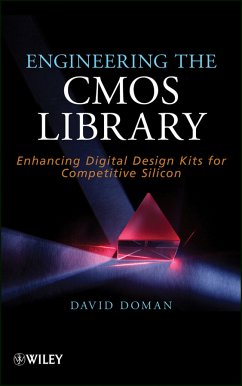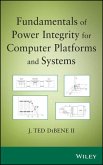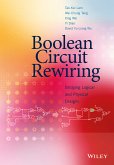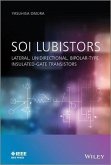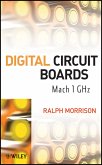Engineering the CMOS Library (eBook, ePUB)
Enhancing Digital Design Kits for Competitive Silicon


Alle Infos zum eBook verschenken

Engineering the CMOS Library (eBook, ePUB)
Enhancing Digital Design Kits for Competitive Silicon
- Format: ePub
- Merkliste
- Auf die Merkliste
- Bewerten Bewerten
- Teilen
- Produkt teilen
- Produkterinnerung
- Produkterinnerung

Hier können Sie sich einloggen

Bitte loggen Sie sich zunächst in Ihr Kundenkonto ein oder registrieren Sie sich bei bücher.de, um das eBook-Abo tolino select nutzen zu können.
Shows readers how to gain the competitive edge in the integrated circuit marketplace This book offers a wholly unique perspective on the digital design kit. It points to hidden value in the safety margins of standard-cell libraries and shows design engineers and managers how to use this knowledge to beat the competition. Engineering the CMOS Library reveals step by step how the generic, foundry-provided standard-cell library is built, and how to extract value from existing std-cells and EDA tools in order to produce tighter-margined, smaller, faster, less power-hungry, and more yield-producing…mehr
- Geräte: eReader
- mit Kopierschutz
- eBook Hilfe
- Größe: 5.15MB
![Fundamentals of Power Integrity for Computer Platforms and Systems (eBook, ePUB) Fundamentals of Power Integrity for Computer Platforms and Systems (eBook, ePUB)]() Joseph T. DibeneFundamentals of Power Integrity for Computer Platforms and Systems (eBook, ePUB)117,99 €
Joseph T. DibeneFundamentals of Power Integrity for Computer Platforms and Systems (eBook, ePUB)117,99 €![Boolean Circuit Rewiring (eBook, ePUB) Boolean Circuit Rewiring (eBook, ePUB)]() Tak-Kei LamBoolean Circuit Rewiring (eBook, ePUB)123,99 €
Tak-Kei LamBoolean Circuit Rewiring (eBook, ePUB)123,99 €![Terrestrial Radiation Effects in ULSI Devices and Electronic Systems (eBook, ePUB) Terrestrial Radiation Effects in ULSI Devices and Electronic Systems (eBook, ePUB)]() Eishi H. IbeTerrestrial Radiation Effects in ULSI Devices and Electronic Systems (eBook, ePUB)123,99 €
Eishi H. IbeTerrestrial Radiation Effects in ULSI Devices and Electronic Systems (eBook, ePUB)123,99 €![SOI Lubistors (eBook, ePUB) SOI Lubistors (eBook, ePUB)]() Yasuhisa OmuraSOI Lubistors (eBook, ePUB)123,99 €
Yasuhisa OmuraSOI Lubistors (eBook, ePUB)123,99 €![Digital Circuit Boards (eBook, ePUB) Digital Circuit Boards (eBook, ePUB)]() Ralph MorrisonDigital Circuit Boards (eBook, ePUB)78,99 €
Ralph MorrisonDigital Circuit Boards (eBook, ePUB)78,99 €![Electrical Modeling and Design for 3D System Integration (eBook, ePUB) Electrical Modeling and Design for 3D System Integration (eBook, ePUB)]() Er-Ping LiElectrical Modeling and Design for 3D System Integration (eBook, ePUB)111,99 €
Er-Ping LiElectrical Modeling and Design for 3D System Integration (eBook, ePUB)111,99 €![Architectures for Computer Vision (eBook, ePUB) Architectures for Computer Vision (eBook, ePUB)]() Hong JeongArchitectures for Computer Vision (eBook, ePUB)123,99 €
Hong JeongArchitectures for Computer Vision (eBook, ePUB)123,99 €-
-
-
Dieser Download kann aus rechtlichen Gründen nur mit Rechnungsadresse in A, B, BG, CY, CZ, D, DK, EW, E, FIN, F, GR, HR, H, IRL, I, LT, L, LR, M, NL, PL, P, R, S, SLO, SK ausgeliefert werden.
- Produktdetails
- Verlag: John Wiley & Sons
- Seitenzahl: 342
- Erscheinungstermin: 16. Februar 2012
- Englisch
- ISBN-13: 9781118273135
- Artikelnr.: 37361580
- Verlag: John Wiley & Sons
- Seitenzahl: 342
- Erscheinungstermin: 16. Februar 2012
- Englisch
- ISBN-13: 9781118273135
- Artikelnr.: 37361580
Project-Specific Functions, Drive Strengths, Views, and Corners 4 1.2 What
Is a DDK? 5 2 STDCELL LIBRARIES 9 2.1 Lesson from the Real World: Manager's
Perspective and Engineer's Perspective 9 2.2 What Is a Stdcell? 11 2.3
Extended Library Offerings 32 2.4 Boutique Library Offerings 36 2.5
Concepts for Further Study 37 3 IO LIBRARIES 39 3.1 Lesson from the Real
World: The Manager's Perspective and the Engineer's Perspective 39 3.2
Extension Capable Architectures versus Function Complete Architectures 40
3.3 Electrostatic Discharge Considerations 43 3.4 Concepts for Further
Study 50 4 MEMORY COMPILERS 52 4.1 Lesson from the Real World: The
Manager's Perspective and the Engineer's Perspective 52 4.2 Single Ports,
Dual Ports, and ROM: The Compiler 55 4.3 Nonvolatile Memories: The Block 58
4.4 Special-Purpose Memories: The Custom 60 4.5 Concepts for Further Study
62 5 OTHER FUNCTIONS 63 5.1 Lesson from the Real World: The Manager's
Perspective and the Engineer's Perspective 63 5.2 Phase-Locked Loops,
Power-On Resets, and Other Small-Scale Integration Analogs 66 5.3 Low-Power
Support Structures 69 5.4 Stitching Structures 71 5.5 Hard, Firm, and Soft
Boxes 75 5.6 Concepts for Further Study 78 6 PHYSICAL VIEWS 80 6.1 Lesson
from the Real World: The Manager's Perspective and the Engineer's
Perspective 80 6.2 Picking an Architecture 82 6.3 Measuring Density 86 6.4
The Need and the Way to Work with Fabrication Houses 89 6.5 Concepts for
Further Study 92 7 SPICE 95 7.1 Lesson from the Real World: The Manager's
Perspective and the Engineer's Perspective 95 7.2 Why a Tool More Than 40
Years Old Is Still Useful 99 7.3 Accuracy, Reality, and Why SPICE Results
Must be Viewed with a Wary Eye 102 7.4 Sufficient Parasitics 106 7.5
Concepts for Further Study 107 8 TIMING VIEWS 109 8.1 Lesson from the Real
World: The Manager's Perspective and the Engineer's Perspective 109 8.2
Performance Limits and Measurement 110 8.3 Default Versus Conditional Arcs
110 8.4 Break-Point Optimization 112 8.5 A Word on Setup and Hold 115 8.6
Failure Mechanisms and Roll-Off 122 8.7 Supporting Efficient Synthesis 124
8.8 Supporting Efficient Timing Closure 131 8.9 Design Corner Specific
Timing Views 134 8.10 Nonlinear Timing Views are so "Old Hat" . . . 140
8.11 Concepts for Further Study 142 9 POWER VIEWS 145 9.1 Lesson from the
Real World: The Manager's Perspective and the Engineer's Perspective 145
9.2 Timing Arcs Versus Power Arcs 147 9.3 Static Power 148 9.4 Real Versus
Measured Dynamic Power 150 9.5 Should Power Be Built as a Monotonic Array?
153 9.6 Best-Case and Worst-case Power Views Versus Best-Case and
Worst-Case Timing Views 155 9.7 Efficiently Measuring Power 156 9.8
Concepts for Further Study 158 10 NOISE VIEWS 160 10.1 Lesson from the Real
World: The Manager's Perspective and the Engineer's Perspective 160 10.2
Noise Arcs Versus Timing and Power Arcs 162 10.3 The Easy Part 165 10.4 The
Not-So-Easy Part 166 10.5 Concepts for Further Study 168 11 LOGICAL VIEWS
170 11.1 Lesson from the Real World: The Manager's Perspective and the
Engineer's Perspective 170 11.2 Consistency Across Simulators 171 11.2.1
Efficient Testing 175 11.3 Consistency with Timing, Power & Noise Views 177
11.4 Concepts for Further Study 180 12 TEST VIEWS 181 12.1 Lesson from the
Real World: The Manager's Perspective and the Engineer's Perspective 181
12.2 Supporting Reachability 184 12.3 Supporting Observability 189 12.4
Concepts for Further Study 191 13 CONSISTENCY 193 13.1 Lesson from the Real
World: The Manager's Perspective and the Engineer's Perspective 193 13.2
Validating Views across a Library 195 13.3 Validating Stdcells Across a
Technology Node 199 13.4 Validating Libraries Across Multiple Technology
Nodes 204 13.5 Concepts for Further Study 208 14 DESIGN FOR
MANUFACTURABILITY 209 14.1 Lesson from the Real World: The Manager's
Perspective and the Engineer's Perspective 209 14.2 What is DFM? 211 14.3
Concepts for Further Study 224 15 VALIDATION 226 15.1 Lesson from the Real
World: The Manager's Perspective and the Engineer's Perspective 226 15.2
Quality Levels 229 15.3 Concepts for Further Study 236 16 PLAYING WITH THE
PHYSICAL DESIGN KIT: USUALLY "AT YOUR OWN RISK" 237 16.1 Lesson from the
Real World: The Manager's Perspective and the Engineer's Perspective 237
16.2 Manipulating Models 240 16.3 Added Unsupported Devices 243 16.4
Concepts for Further Study 245 17 TAGGING AND REVISIONING 247 17.1 Lesson
from the Real World: The Manager's Perspective and the Engineer's
Perspective 247 17.2 Tagging and Time Stamps 248 17.3 Metadata, Directory
Structures, and Pointers 254 17.4 Concepts for Further Study 258 18
RELEASING AND SUPPORTING 260 18.1 Lesson from the Real World: The Manager's
Perspective and the Engineer's Perspective 260 18.2 When Is Test Silicon
Needed for Verification? 263 18.3 Sending the Baby Out the Door 265 18.4
Multiple Quality Levels on the Same Design 269 18.5 Supporting "Bug Fixes"
271 18.6 Concepts for Further Study 274 19 OTHER TOPICS 276 19.1 Lesson
from the Real World: The Manager's Perspective and the Engineer's
Perspective 276 19.2 Supporting High-Speed Design 279 19.3 Supporting
Low-Power Design 283 19.4 Supporting Third-Party Libraries 286 19.5
Supporting Black Box Third-Party IP (Intellectual Property) Design 289 19.6
Supporting Multiple Library Design 292 19.7 Concepts for Further Study 293
20 COMMUNICATIONS 295 20.1 Manager's Perspective 295 20.2 Customer's
Perspective 298 20.3 Vendor's Perspective 300 20.4 Engineer's Perspective
301 20.5 Concepts for Further Study 302 20.6 Conclusions 302 APPENDIX I
MINIMUM LIBRARY SYNTHESIS VERSUS FULL-LIBRARY SYNTHESIS OF A FOUR-BIT FLASH
ADDER 305 APPENDIX II PERTINENT CMOS BSIM SPICE PARAMETERS WITH UNITS AND
DEFAULT LEVELS 311 APPENDIX III DEFINITION OF TERMS 313 APPENDIX IV ONE
POSSIBLE MEANS OF FORMALIZED MONTHLY REPORTING 317 INDEX 319
Project-Specific Functions, Drive Strengths, Views, and Corners 4 1.2 What
Is a DDK? 5 2 STDCELL LIBRARIES 9 2.1 Lesson from the Real World: Manager's
Perspective and Engineer's Perspective 9 2.2 What Is a Stdcell? 11 2.3
Extended Library Offerings 32 2.4 Boutique Library Offerings 36 2.5
Concepts for Further Study 37 3 IO LIBRARIES 39 3.1 Lesson from the Real
World: The Manager's Perspective and the Engineer's Perspective 39 3.2
Extension Capable Architectures versus Function Complete Architectures 40
3.3 Electrostatic Discharge Considerations 43 3.4 Concepts for Further
Study 50 4 MEMORY COMPILERS 52 4.1 Lesson from the Real World: The
Manager's Perspective and the Engineer's Perspective 52 4.2 Single Ports,
Dual Ports, and ROM: The Compiler 55 4.3 Nonvolatile Memories: The Block 58
4.4 Special-Purpose Memories: The Custom 60 4.5 Concepts for Further Study
62 5 OTHER FUNCTIONS 63 5.1 Lesson from the Real World: The Manager's
Perspective and the Engineer's Perspective 63 5.2 Phase-Locked Loops,
Power-On Resets, and Other Small-Scale Integration Analogs 66 5.3 Low-Power
Support Structures 69 5.4 Stitching Structures 71 5.5 Hard, Firm, and Soft
Boxes 75 5.6 Concepts for Further Study 78 6 PHYSICAL VIEWS 80 6.1 Lesson
from the Real World: The Manager's Perspective and the Engineer's
Perspective 80 6.2 Picking an Architecture 82 6.3 Measuring Density 86 6.4
The Need and the Way to Work with Fabrication Houses 89 6.5 Concepts for
Further Study 92 7 SPICE 95 7.1 Lesson from the Real World: The Manager's
Perspective and the Engineer's Perspective 95 7.2 Why a Tool More Than 40
Years Old Is Still Useful 99 7.3 Accuracy, Reality, and Why SPICE Results
Must be Viewed with a Wary Eye 102 7.4 Sufficient Parasitics 106 7.5
Concepts for Further Study 107 8 TIMING VIEWS 109 8.1 Lesson from the Real
World: The Manager's Perspective and the Engineer's Perspective 109 8.2
Performance Limits and Measurement 110 8.3 Default Versus Conditional Arcs
110 8.4 Break-Point Optimization 112 8.5 A Word on Setup and Hold 115 8.6
Failure Mechanisms and Roll-Off 122 8.7 Supporting Efficient Synthesis 124
8.8 Supporting Efficient Timing Closure 131 8.9 Design Corner Specific
Timing Views 134 8.10 Nonlinear Timing Views are so "Old Hat" . . . 140
8.11 Concepts for Further Study 142 9 POWER VIEWS 145 9.1 Lesson from the
Real World: The Manager's Perspective and the Engineer's Perspective 145
9.2 Timing Arcs Versus Power Arcs 147 9.3 Static Power 148 9.4 Real Versus
Measured Dynamic Power 150 9.5 Should Power Be Built as a Monotonic Array?
153 9.6 Best-Case and Worst-case Power Views Versus Best-Case and
Worst-Case Timing Views 155 9.7 Efficiently Measuring Power 156 9.8
Concepts for Further Study 158 10 NOISE VIEWS 160 10.1 Lesson from the Real
World: The Manager's Perspective and the Engineer's Perspective 160 10.2
Noise Arcs Versus Timing and Power Arcs 162 10.3 The Easy Part 165 10.4 The
Not-So-Easy Part 166 10.5 Concepts for Further Study 168 11 LOGICAL VIEWS
170 11.1 Lesson from the Real World: The Manager's Perspective and the
Engineer's Perspective 170 11.2 Consistency Across Simulators 171 11.2.1
Efficient Testing 175 11.3 Consistency with Timing, Power & Noise Views 177
11.4 Concepts for Further Study 180 12 TEST VIEWS 181 12.1 Lesson from the
Real World: The Manager's Perspective and the Engineer's Perspective 181
12.2 Supporting Reachability 184 12.3 Supporting Observability 189 12.4
Concepts for Further Study 191 13 CONSISTENCY 193 13.1 Lesson from the Real
World: The Manager's Perspective and the Engineer's Perspective 193 13.2
Validating Views across a Library 195 13.3 Validating Stdcells Across a
Technology Node 199 13.4 Validating Libraries Across Multiple Technology
Nodes 204 13.5 Concepts for Further Study 208 14 DESIGN FOR
MANUFACTURABILITY 209 14.1 Lesson from the Real World: The Manager's
Perspective and the Engineer's Perspective 209 14.2 What is DFM? 211 14.3
Concepts for Further Study 224 15 VALIDATION 226 15.1 Lesson from the Real
World: The Manager's Perspective and the Engineer's Perspective 226 15.2
Quality Levels 229 15.3 Concepts for Further Study 236 16 PLAYING WITH THE
PHYSICAL DESIGN KIT: USUALLY "AT YOUR OWN RISK" 237 16.1 Lesson from the
Real World: The Manager's Perspective and the Engineer's Perspective 237
16.2 Manipulating Models 240 16.3 Added Unsupported Devices 243 16.4
Concepts for Further Study 245 17 TAGGING AND REVISIONING 247 17.1 Lesson
from the Real World: The Manager's Perspective and the Engineer's
Perspective 247 17.2 Tagging and Time Stamps 248 17.3 Metadata, Directory
Structures, and Pointers 254 17.4 Concepts for Further Study 258 18
RELEASING AND SUPPORTING 260 18.1 Lesson from the Real World: The Manager's
Perspective and the Engineer's Perspective 260 18.2 When Is Test Silicon
Needed for Verification? 263 18.3 Sending the Baby Out the Door 265 18.4
Multiple Quality Levels on the Same Design 269 18.5 Supporting "Bug Fixes"
271 18.6 Concepts for Further Study 274 19 OTHER TOPICS 276 19.1 Lesson
from the Real World: The Manager's Perspective and the Engineer's
Perspective 276 19.2 Supporting High-Speed Design 279 19.3 Supporting
Low-Power Design 283 19.4 Supporting Third-Party Libraries 286 19.5
Supporting Black Box Third-Party IP (Intellectual Property) Design 289 19.6
Supporting Multiple Library Design 292 19.7 Concepts for Further Study 293
20 COMMUNICATIONS 295 20.1 Manager's Perspective 295 20.2 Customer's
Perspective 298 20.3 Vendor's Perspective 300 20.4 Engineer's Perspective
301 20.5 Concepts for Further Study 302 20.6 Conclusions 302 APPENDIX I
MINIMUM LIBRARY SYNTHESIS VERSUS FULL-LIBRARY SYNTHESIS OF A FOUR-BIT FLASH
ADDER 305 APPENDIX II PERTINENT CMOS BSIM SPICE PARAMETERS WITH UNITS AND
DEFAULT LEVELS 311 APPENDIX III DEFINITION OF TERMS 313 APPENDIX IV ONE
POSSIBLE MEANS OF FORMALIZED MONTHLY REPORTING 317 INDEX 319
